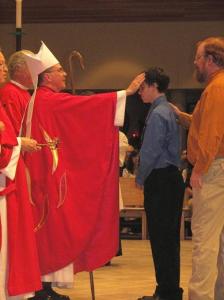The sacrament of Confirmation is the third member of the ‘sacraments of Christian initiation’, the others Baptism and the Eucharist we have dealt with in previous posts. The sacrament of Confirmation is necessary for the completion of baptismal grace (cf. CCC 1285) because through it we are bound more closely to Christ and his Church by the power of the Holy Spirit.
In fact, a Confirmed member of the Catholic Church is obliged, in a stricter sense than one merely Baptised, to spread the faith and to live in accordance with God’s will. In the Roman Rite of the Catholic Church (to which the Australian Church belongs) Confirmation is celebrated separately from Baptism but this is not to say that these sacraments are not linked. They are. In fact Baptism and Confirmation are inextricably linked. ‘When Confirmation is celebrated separately from Baptism, its connection with Baptism is expressed, among other ways, by the renewal of baptismal promises.’ (CCC 1321)
The only exception to this rule of course, is the Rite of Christian Initiation, where these sacraments are received in the same ceremony, along with the reception of the Eucharist. Despite our celebrating them separately, the very liturgy of Confirmation evidences that it follows on from, and strengthens, that which began at Baptism. This connection is explained by the Church in the following way: ‘Confirmation perfects Baptismal grace’ (CCC 1316)
There is another reason that these two sacraments have been separated and that is that the minister of Confirmation is the bishop. As a successor of the apostles, the bishop unites those receiving the sacrament of Confirmation, to the Church as well as to the apostolic origins of the Church.
Similarly to Baptism, Confirmation can only be received once in our life as it leaves a spiritual mark or character on our soul. And the effects of such a mark are far reaching and life-changing.
The effect of the outpouring of the Holy Spirit during the sacrament of Confirmation is the same as that experienced by the apostles on the day of Pentecost. ‘From this fact, Confirmation brings an increase and deepening of baptismal grace: – it roots us more deeply in the divine filiation which makes us cry, ‘Abba! Father!’; – it unites us more firmly to Christ; – it increases the gifts of the Holy Spirit in us; – it renders our bond with the Church more perfect; – it gives us a special strength of the Holy Spirit to spread and defend the faith by word and action as true witnesses of Christ, to confess the name of Christ boldly, and never to be ashamed of the Cross.’ (CCC 1303)
In addition to these effects we receive the seven gifts of the Holy Spirit: wisdom, understanding, knowledge, counsel, awe, reverence and fortitude. These gifts enable us to treasure spiritual things above all earthly ones, to understand more clearly the mysteries of our faith, to listen to and follow the will of God, to love and revere God and his Church, and strengthens us to follow God’s will especially when we are tempted to other things instead.
In essence then, Confirmation builds upon and strengthens the spiritual graces we received at our Baptism and fills us with the Holy Spirit in the same way that the apostles experienced it on the day of Pentecost. Indeed, just like them, we are called to be witnesses to the ends of the earth for Christ and we have been given the graces necessary, through our Confirmation, to do just that.
Originally posted 2015-01-07 22:38:18.

